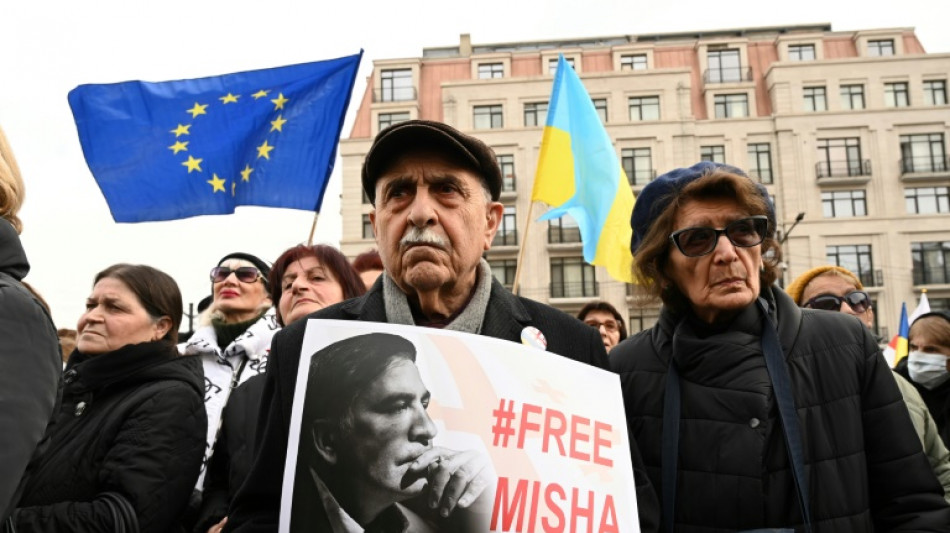

Georgia jailed ex-leader claims doctors trying to 'kill' him
Georgia's jailed ex-president Mikheil Saakashvili on Wednesday accused state-appointed doctors of refusing to treat him and being part of an alleged conspiracy to "kill" him.
His claims came after doctors told journalists earlier Wednesday that his health was seriously deteriorating due to drastic weight loss.
In a statement posted on Facebook, Saakashvili said that state-appointed doctors had "refused to treat my underlying conditions" including "the poisoning by heavy metals" and anorexia.
He accused Georgia's ruling party, pro-government media "and now the hospital" of being part of a "special operation to kill me, of which we are witnessing the final stage".
Once a jovial, larger-than-life personality, Saakashvili has become a shadow of his former self, his lawyers and doctors say. He has lost nearly 50 kilograms since his imprisonment in 2021.
The 55-year-old pro-Western reformer was arrested in 2021, days after secretly returning to the Caucasus country from exile.
He has been in hospital since last year after refusing food for 50 days to protest his detention, which rights groups say is politically motivated.
On Wednesday, the opposition politician's doctor, Tamar Davarashvili, told a news conference that Saakashvili could soon end up in intensive care.
"The patient's condition is becoming serious," she said.
"His weight and body mass are extremely low," she said, adding that the "next stage could be an intensive care unit".
She added that Saakashvili -- who weighed 115 kilogrammes when he was jailed in October, 2021 -- now weighs just 67 kilogrammes.
Davarashvili described him as weak and bedridden and said he suffered pain in his limbs.
A group of US-based doctors have said that Saakashvili is suffering from serious neurological, gastrointestinal and orthopaedic conditions.
They said the deterioration of his health was the result of "torture" in custody.
American toxicologist David Smith claimed in 2022 that tests had revealed Saakashvili had been exposed to poisoning by heavy metals while in custody.
- 'Litmus test' -
The Georgian doctors' news conference followed numerous calls from the West for the Black Sea country's government to release Saakashvili on humanitarian grounds.
Last week, the European Parliament passed a resolution demanding that the Georgian government release Saakashvili and allow him to receive medical treatment abroad.
"The way former President Mikheil Saakashvili is being treated is a litmus test of the Georgian government's commitment to European values," said the resolution supported by more than 570 MEPs.
The United States and European Union have expressed concern over Saakashvili's condition and urged Tbilisi to ensure his rights are protected.
Ukrainian President Volodymyr Zelensky has accused Georgia of "slowly killing" Saakashvili and demanded his transfer to a Ukrainian or western clinic.
Polish leaders have made similar calls.
The Georgian government insists Saakashvili is being given adequate care and that his rights are being protected.
- 'Opposed to Putin' -
In early February, a court in Georgia rejected Saakashvili's bid to get his six-year sentence for alleged abuse of office deferred over poor health.
Saakashvili was convicted in absentia for abuse of office and sentenced to six years in prison in 2018.
His jailing has sparked the biggest anti-government protests Georgia has seen for decades, with tens of thousands taking to the streets.
Saakashvili came to power on the back of the peaceful Rose Revolution in 2003.
During his term as president between 2004 and 2013, he introduced sweeping political and economic reforms and forged closer ties with the West.
However, he infuriated Russian leader Vladimir Putin, his long-time nemesis, and Russia and Georgia fought a five-day war in 2008.
The Council of Europe has called for the politician's release, branding him a "political prisoner opposed to Putin".
Amnesty International has called his treatment "apparent political revenge".
M.E.Molina--ESF




